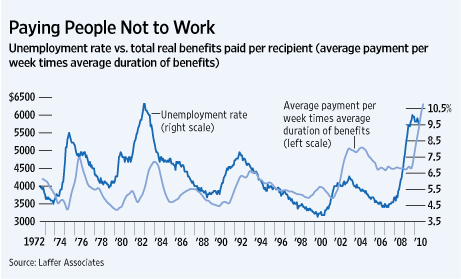CERF Blog
Famous economist Arthur Laffer has a piece in the Wall Street Journal today where he argues two points: unemployment insurance causes unemployment even in bad times and unemployment insurance is not stimulus.
I’ll stipulate his second point, but his first point is all wrong.
The data make it pretty clear that unemployment insurance increases unemployment in good times. An amazing percentage of unemployed find jobs the last week of eligibility. Of course, these aren’t ordinary times. Given the difficulties in finding a job in this market, and given the average duration of unemployment, it is easy to believe that there are very few people who are unemployed because of unemployment benefits.
Laffer presents the following chart, and he claims that is proves his point that unemployment benefits cause unemployment.
He says:
“As the chart nearby clearly shows, since the 1970s there’s been a close correlation between increased unemployment benefits and an increase in the unemployment rate. Those who argue that things are different today don’t have the data to back up their claims.”
There is a correlation, no doubt about that, but as Mr. Laffer has surely heard countless times, correlation does not imply causation. It looks to me that the unemployment insurance lags unemployment. That would imply that unemployment causes unemployment benefits.
Of course, that’s the way it seems to work in practice. When unemployment becomes extraordinarily high and its duration long, governments extend benefits. That seems like the right thing to do. It’s not stimulus, and people who claim it is stimulus are uninformed or dissembling. It’s just one of those humanitarian things we do to share the costs of a deep recession. Think of it as mutual insurance.



